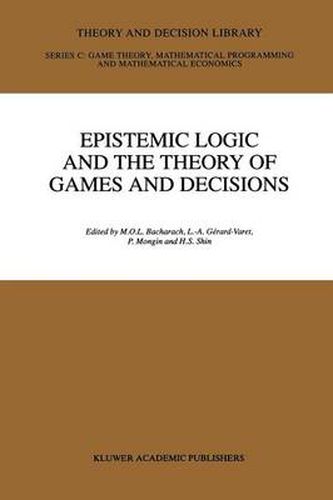Readings Newsletter
Become a Readings Member to make your shopping experience even easier.
Sign in or sign up for free!
You’re not far away from qualifying for FREE standard shipping within Australia
You’ve qualified for FREE standard shipping within Australia
The cart is loading…






This title is printed to order. This book may have been self-published. If so, we cannot guarantee the quality of the content. In the main most books will have gone through the editing process however some may not. We therefore suggest that you be aware of this before ordering this book. If in doubt check either the author or publisher’s details as we are unable to accept any returns unless they are faulty. Please contact us if you have any questions.
This book arose out of a conference on Epistemic Logic and the Theory of Games and Decisions that took place in January 1994 at the Centre Inter- national de Recherches Mathematiques in Marseille. The convergence of game theory and epistemic logic has been in progress for two decades. The aim of the conference was to explore this rapprochement further by gathering spe- cialists from different professional communities, i. e. , economics, mathematics, philosophy, and computer science. Also, the organizors aimed at fostering the work centered on the issues of knowledge and belief that has recently been pursued amongst game theorists and decision theorists. The conference was funded by the following institutions: Centre National de la Recherche Sci- entifique (France), Ministere de l'Enseignement Superieur et de la Recherche (France), Association pour Ie Developpement de la Recherche en Economie et Statistique (France). It was also supported by the Human Capital and Mobility Programme of the EU, as well as, locally, by the Ville de Marseille. We would like to express our gratitude to these institutions for their generous help. Despite the success of the conference, it was not the editors’ intention to circulate just another volume of proceedings in the usual style. Throughout the more than two-year editorial process, they have pursued the goal of providing a no doubt non-exhaustive, but hopefully thorough and accurate, state of the art account of a promising field of research.
$9.00 standard shipping within Australia
FREE standard shipping within Australia for orders over $100.00
Express & International shipping calculated at checkout
This title is printed to order. This book may have been self-published. If so, we cannot guarantee the quality of the content. In the main most books will have gone through the editing process however some may not. We therefore suggest that you be aware of this before ordering this book. If in doubt check either the author or publisher’s details as we are unable to accept any returns unless they are faulty. Please contact us if you have any questions.
This book arose out of a conference on Epistemic Logic and the Theory of Games and Decisions that took place in January 1994 at the Centre Inter- national de Recherches Mathematiques in Marseille. The convergence of game theory and epistemic logic has been in progress for two decades. The aim of the conference was to explore this rapprochement further by gathering spe- cialists from different professional communities, i. e. , economics, mathematics, philosophy, and computer science. Also, the organizors aimed at fostering the work centered on the issues of knowledge and belief that has recently been pursued amongst game theorists and decision theorists. The conference was funded by the following institutions: Centre National de la Recherche Sci- entifique (France), Ministere de l'Enseignement Superieur et de la Recherche (France), Association pour Ie Developpement de la Recherche en Economie et Statistique (France). It was also supported by the Human Capital and Mobility Programme of the EU, as well as, locally, by the Ville de Marseille. We would like to express our gratitude to these institutions for their generous help. Despite the success of the conference, it was not the editors’ intention to circulate just another volume of proceedings in the usual style. Throughout the more than two-year editorial process, they have pursued the goal of providing a no doubt non-exhaustive, but hopefully thorough and accurate, state of the art account of a promising field of research.